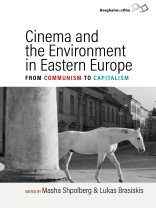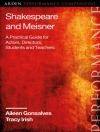The annexation of Eastern Europe to the Soviet sphere after World War II dramatically reshaped popular understandings of the natural environment. With an eco-critical approach, Cinema and the Environment in Eastern Europe breaks new ground in documenting how filmmakers increasingly saw cinema as a tool to critique the social and environmental damage of large-scale projects from socialist regimes and newly forming capitalist presences. New and established scholars with backgrounds across Europe, the United States, and Australia come together to reflect on how the cultural sphere has, and can still, play a role in redefining our relationship to nature.
Table of Content
List of Illustrations
Introduction
Masha Shpolberg and Lukas Brasiskis
Part I: Industrializing the Bloc: Cinema of the Socialist Period
Chapter 1. Sad Landscapes: Panoramic Photography and Documentary Film in the Czech Lands
Katie Trumpener and Alice Lovejoy
Chapter 2. From Mastery to Indistinction: Nature in Thaw-Era Cinema
Lida Oukaderova
Chapter 3. Spectres of Ecology in Cold War Soviet Science Fiction Film
Natalija Majsova
Part II: Environmental Crisis and the Nuclear Imaginary
Chapter 4. Post-Apocalyptic Landscapes: The End of August at the Hotel Ozone and the Czechoslovak New Wave
Barbora Bartunkova
Chapter 5. Fallow Fields: Crises of Masculinity and Ecology in Piotr Andrejew’s ‘Tender Spots’
Eliza Rose
Chapter 6. Catastrophe, Obliquely: The Revival of the Essay Film Form in Soviet Documentaries About Chernobyl
Masha Shpolberg
Part III: Animals Between the Natural and the Social
Chapter 7. Animals in Modernity: Shaping the Urban Landscape in Lithuanian Documentary
Natalija Arlauskaitė
Chapter 8. Mongrelizing Interpretation: The Animal in Contemporary Hungarian Cinema
Raymond De Luca
Part IV: From Communism to Capitalism: Privatization and the Commons
Chapter 9. Okraina and ‘Oil Ontology’ in Post-Soviet Russian Cinema
José Alaniz
Chapter 10. The Commercialization and Destruction of Nature in Contemporary Bulgarian Cinema
Dina Iordanova
Part V: Towards an Eastern European Eco-cinema
Chapter 11. Coming to the Senses: Environmental Ethics in Contemporary Slovenian Cinema
Meta Mazaj
Chapter 12. Cinema of the Forest People: Environmental Consciousness, Authorship and Genre in Post-1989 Polish Film
Kris Van Heuckelom
Chapter 13. Beyond the Utopian Landscape in Post-Soviet Russian Cinema
Jeremi Szaniawski and Michael Cramer
Chapter 14. Recycling, Citroën Cars, and Roma Refugees in Boris Mitić’s Pretty Dyana (2003)
Alice Bardan
Chapter 15. From Water to Wind: Elemental Critique in Recent Eastern European Video Art
Lukas Brasiskis
About the author
Masha Shpolberg is Assistant Professor of Film and Electronic Arts at Bard College. She is currently at work on a book entitled Labor in Late Socialism: The Cinema of Polish Workers’ Unrest. In addition to this volume, she is also co-editor, with Anastasia Kostina, of Contemporary Russian Documentary, forthcoming from Edinburgh University Press.












